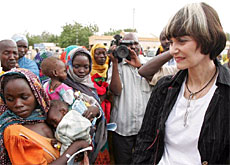Swiss demand political solution to Darfur crisis
GENEVA, June 29, 2004 (Swissinfo) — The Swiss foreign minister, Micheline Calmy-Rey, has called for a political solution to the ongoing humanitarian crisis in the Darfur region of western Sudan.
Calmy-Rey, who has just visited the African nation, said aid alone would not be enough to end the conflict between rebels and government-backed militias
 During talks with the Swiss foreign minister, Sudanese President Omar Bashir admitted that Darfur was not safe for civilians and promised to take measures.
During talks with the Swiss foreign minister, Sudanese President Omar Bashir admitted that Darfur was not safe for civilians and promised to take measures.
On Tuesday, Calmy-Rey said Switzerland’s biggest concern was the wellbeing of the civilian population in Darfur. After visiting camps for displaced persons, she declared she was shocked by the conditions there.
“In different camps, we saw cases of malnutrition and saw how many women have to take care of their families alone,” said the foreign minister.
It is believed that around one million people have been made homeless in the region since early last year, with 200,000 fleeing to neighbouring Chad, according to UN figures.
At least 10,000 people have died in the fighting, and another two million are in need of food and other aid in Darfur.
Ethnic cleansing
Sudan’s government is considered at least partially responsible for the conflict, as it is reported to have supplied Arab militias with weapons. This has also led to accusations of ethnic cleansing.
Calmy-Rey said she believed that humanitarian aid, however necessary, would not suffice on its own to bring about an end to the fighting. She added that the international response to the crisis had been slow.
Her five-day trip to Sudan, the first by a Swiss foreign minister, came amid intense diplomatic activity.
The French and Italian foreign ministers have also visited Khartoum, while the American secretary of state, Colin Powell, and the United Nations secretary-general, Kofi Annan, are both expected in the Sudanese capital.
Calmy-Rey said that international pressure had begun to produce some results.
Khartoum has eased access to the region for non-governmental organisations, but many towns and villages are still isolated. According to Calmy-Rey, this explained why locals were still seeking refuge in camps across Darfur.
Swiss solution
For over ten years, Switzerland has been heavily involved in finding a solution to another Sudanese conflict – between southern separatists and Khartoum.
A provisional agreement was finally hammered out recently. It would give half of the area’s valuable oil revenues to the separatist movement and allow it to maintain its own army.
Final details still have to be agreed upon before the 21-year-old conflict can end.
“The north-south agreement gives the south a large degree of self-determination,” Josef Bucher, Switzerland’s special representative on conflict issues, told swissinfo.
“In the north, there are also three regions demanding more autonomy – something two of them already have – but they aren’t seceding from the rest of the country, nor do they have their own army.”
Bucher says that Darfur – which straddles the north and the south – doesn’t want to split from the rest of Sudan either, which in his view, is just as well.
“The government in Khartoum is not prepared to make any concessions now,” he added. “It would involve major concessions that can’t be negotiated in a day.”
